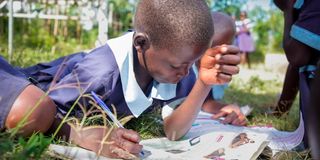Let free quality education for all be a reality

Pupils at Mboto Sunrise Primary School work on their competency-based curriculum assignment under a tree in September last year.
I recently came across the heartbreaking story of Gloria, a 13-year-old girl from Mukuru Kwa Njenga informal settlements forced to drop out of school and work at a dumpsite because her mother could not afford school fees.
Cases of parents’ inability to pay school fees keep recurring, pointing to the fact that affordability is the biggest hindrance to education across Africa. Households battling the high cost of living, unemployment and droughts, among other factors, are unable to pay school fees or foot other costs such as uniforms, books, transport and meals.
Some 42 countries in Africa now guarantee free primary education through Universal Primary Education policies, yet there is a big dropout rate. Globally, 244 million children and youth aged 6-18 were out of school in 2021. Of these, more than 40 per cent, or 98 million, live in sub-Saharan Africa: Nigeria (20.2 million), Ethiopia (10.5 million), DRC (5.9 million) and Kenya (1.8 million), says Unesco.
Now is the time to translate free education policies into concrete actions that create supportive and inclusive learning environments for all children, especially from financially disadvantaged families.
Supporting free education should not be negotiable. Most governments can pay school fees for every child whose parent is genuinely unable to. It is possible and fiscally doable.
Governments should also allocate enough resources towards building more classrooms, paying teachers, constructing sanitation facilities and providing learning materials.
This is, however, not the job of the government alone. The journey to transform education for the better begins and ends with local communities. Everyone, rich or poor, has something to offer. This is where alternative modes of paying fees come in.
Advocate policies
Schools should accept fees in forms other than cash. Parents can be allowed to pay fees using livestock and food items such as maize and beans. Schools use these commodities daily, and their quantity can be translated to money. Others can work for schools—on construction sites, compound maintenance or gardens to produce food.
Communities should also advocate policies that promote free education for all. Parents should be at the forefront pushing for improved school infrastructure and adequate learning resources. They must also lead the push to end discriminatory practices that deny children education. In some communities, girls still don’t receive education as they are married off. Boys join the seemingly lucrative boda boda public transport motorcycle business.
The community must be partners in the process to achieve zero out-of-school children and 100 per cent transition from primary to secondary school.
It is the time for joint and accelerated action. Otherwise, we will continue to see more miserable stories of Gloria’s kind and risk having a generation of thousands of uneducated people who cannot contribute effectively to the much-needed growth of our beautiful country and continent.
Mr Ngugi is the Africa regional director of ChildFund International. [email protected].





